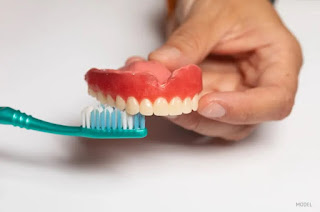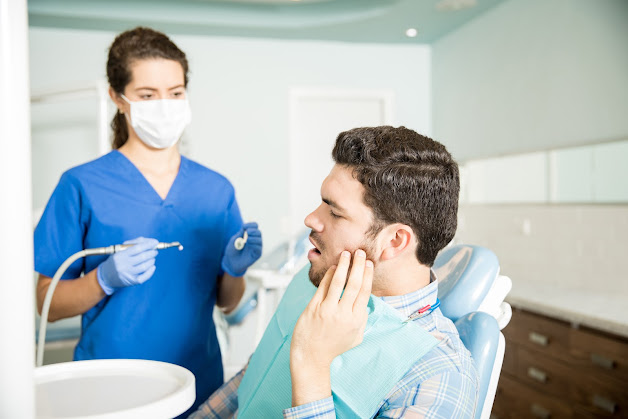Denture Care 101: Cleaning, Storing, and Maintaining Your Dentures
Getting a quality set of dentures from your dentist is an important first step. But caring for your dentures properly and keeping them in excellent shape is just as crucial for your health and smile. With good denture care habits, your dentures can stay clean, fresh, and comfortable while lasting for many years.
As your emergency dentist near Baywood and Pleasant Hill, CA, we want to ensure our patients know how to properly care for their dentures at home. Follow this denture care guide to clean, store, and maintain your removable dentures.
Daily Denture Cleaning
Thorough daily cleaning is essential for keeping dentures fresh and preventing bacterial growth. Here are some simple steps for cleaning your dentures each day:
- After eating, rinse your dentures under warm running water to dislodge loose food particles. Handling them gently to avoid dropping.
- Clean your dentures over a sink filled with water or a towel to avoid damage if you drop them.
- Use a soft-bristled toothbrush and non-abrasive denture cleanser to gently scrub all tooth and gum surfaces. Avoid stiff brushes and strong cleansers that can scratch.
- Pay close attention to crevices and hard-to-reach areas where plaque accumulates. You can use an interdental brush for a deeper clean.
- Rinse all soap residue off thoroughly before placing dentures back in your mouth.
- Use a denture-soaking solution daily if recommended by your dentist. Always follow product instructions.
- Brush your gums, tongue, and roof of your mouth with a soft toothbrush to keep your mouth clean too.
Daily cleaning removes sticky plaque that can irritate gums and harbor odor-causing bacteria. If dentures aren't cleaned well, plaque buildup can also stain the base and teeth of the dentures.
Caring for Dentures Overnight
How you store dentures overnight is important for your oral health. Bacteria multiply quickly while you sleep when your dentures are not properly stored. Here are dentist-recommended tips for overnight care:
- Always remove and rinse dentures before bed, even if they are full dentures. Never sleep with dentures still in your mouth unless advised by your dentist.
- After thoroughly cleaning, completely immerse dentures overnight in cool, clean water or a soaking solution made for dentures. This prevents warping and removes bacteria.
- Empty and rinse the container each morning, and refill with fresh solution at night. Reusing soaking water can harbor harmful bacteria.
- Let your gums rest overnight. This allows your mouth tissues to stay healthy.
- Never place dentures in hot water, as high heat can cause them to warp out of shape over time.
Proper overnight denture storage allows your mouth to recover while protecting your dentures from warping and bacteria.
Caring for Partials and Implant-Supported Dentures
Partial dentures and implant-supported dentures have additional components that require special care. Here are some tips:
- Clean all clasps, wires, plastic parts, and implant abutments with a toothbrush and water. Avoid vigorous scrubbing.
- Use recommended cleansers for partials and implant dentures. Avoid highly abrasive products.
- Remove any plaque around implant abutments to avoid irritation and inflammation of the gums.
- Take any removable parts out at night. Soak and store them as you would a regular denture.
- Use oral irrigators cautiously around implants to avoid damage to abutments.
Check with your dentist if you have questions about properly caring for customized partials or implant-retained dentures. Proper cleaning prevents damage.
While caring for dentures at home is essential, professional maintenance is also key. Be sure to visit your dentist near Baywood and Pleasant Hill, CA, regularly for:
Denture adjustments if they become loose or uncomfortable. Ill-fitting dentures cause sores and irritation.
- Professional cleanings to remove stubborn plaque and stains.
- Inspection of dentures and oral tissues to check for problems.
- Relining or rebasing dentures when they no longer fit snugly due to bone loss. This improves fit and chewing ability.
- Repairs if dentures become cracked, chipped, or broken from wear. Damaged dentures can irritate your mouth.
- Replacement when dentures become too worn. The materials break down over 5-10 years usually.
Scheduling regular denture checkups ensures your dentures stay functioning properly and comfortably. Don't hesitate to come in if they are causing you any discomfort in-between visits.
Caring for your dentures properly is important for keeping your mouth healthy and minimizing expensive repairs or replacements. Contact your Pleasant Hill, CA, dentist's office if you have any questions about the best care for your dentures. With diligent daily and overnight cleaning regimens, professional cleanings and adjustments, your dentures can bring you years of service and confidence.



Comments